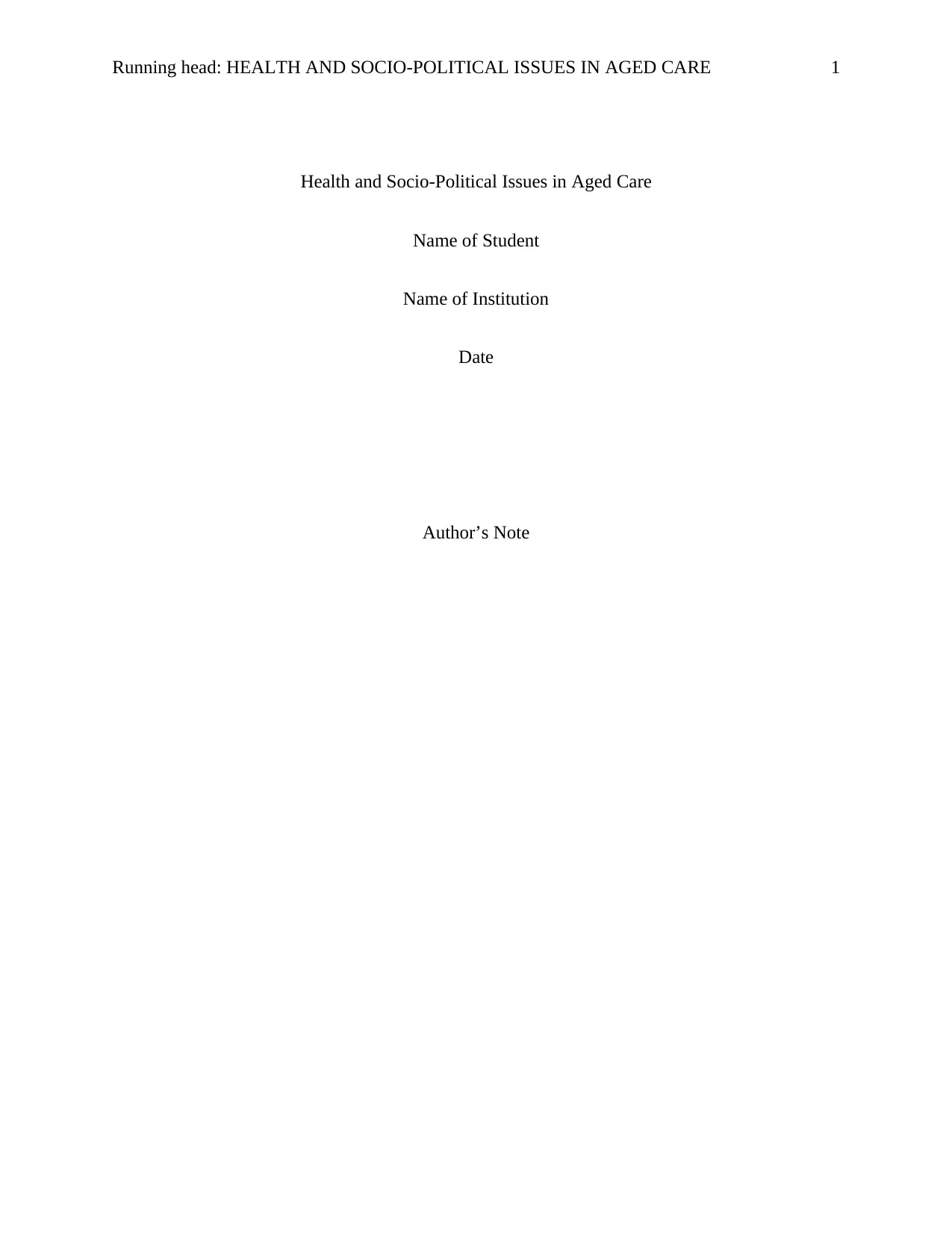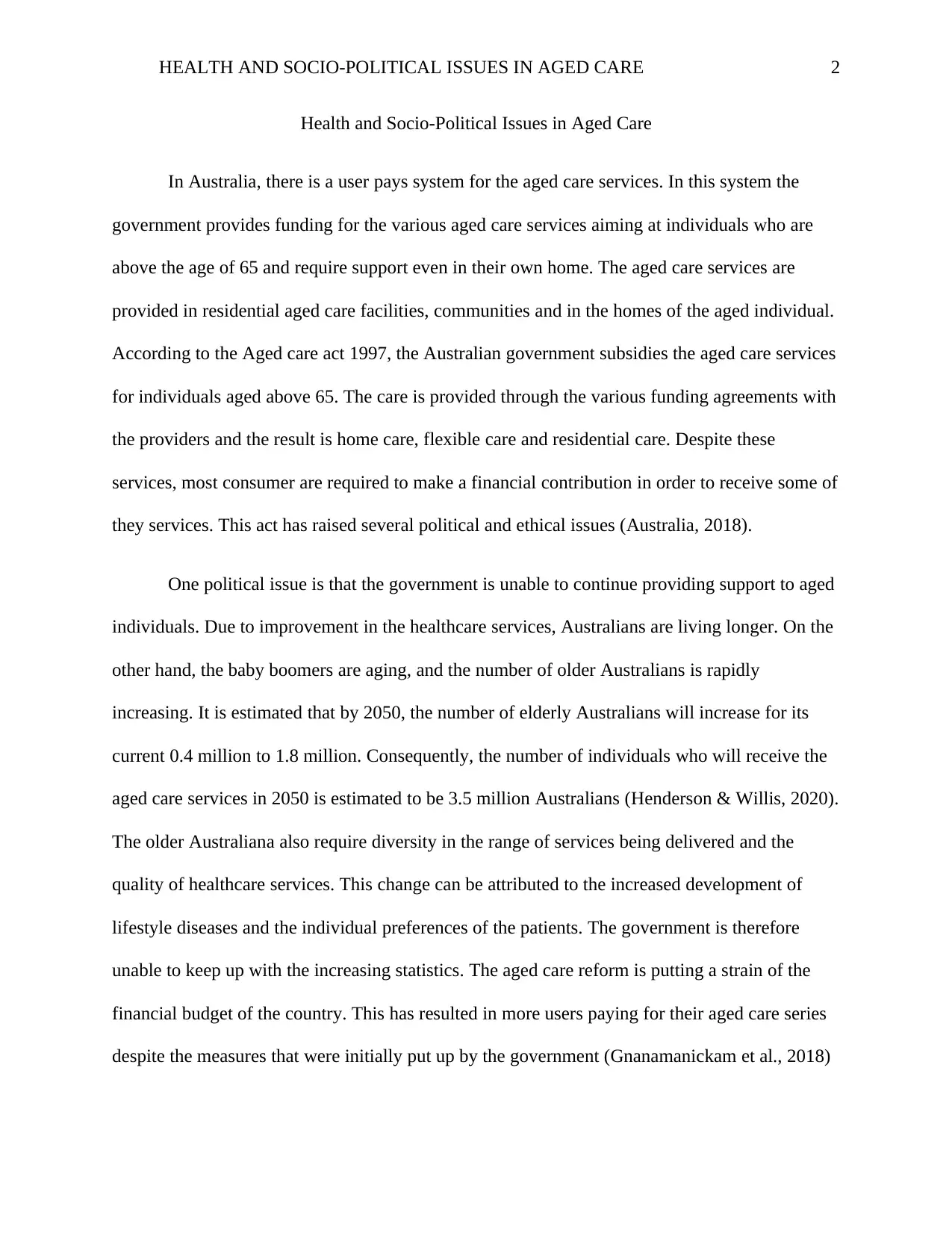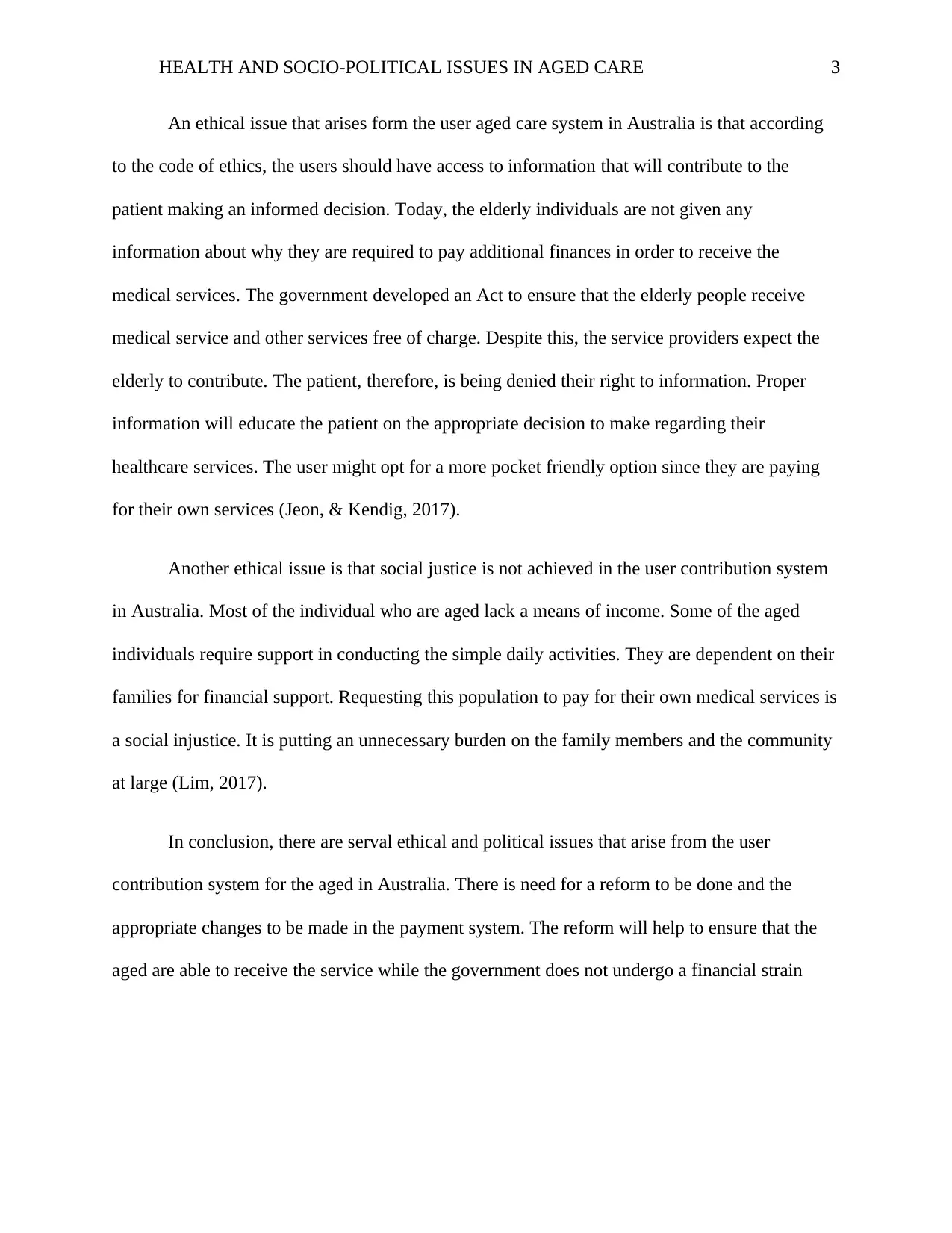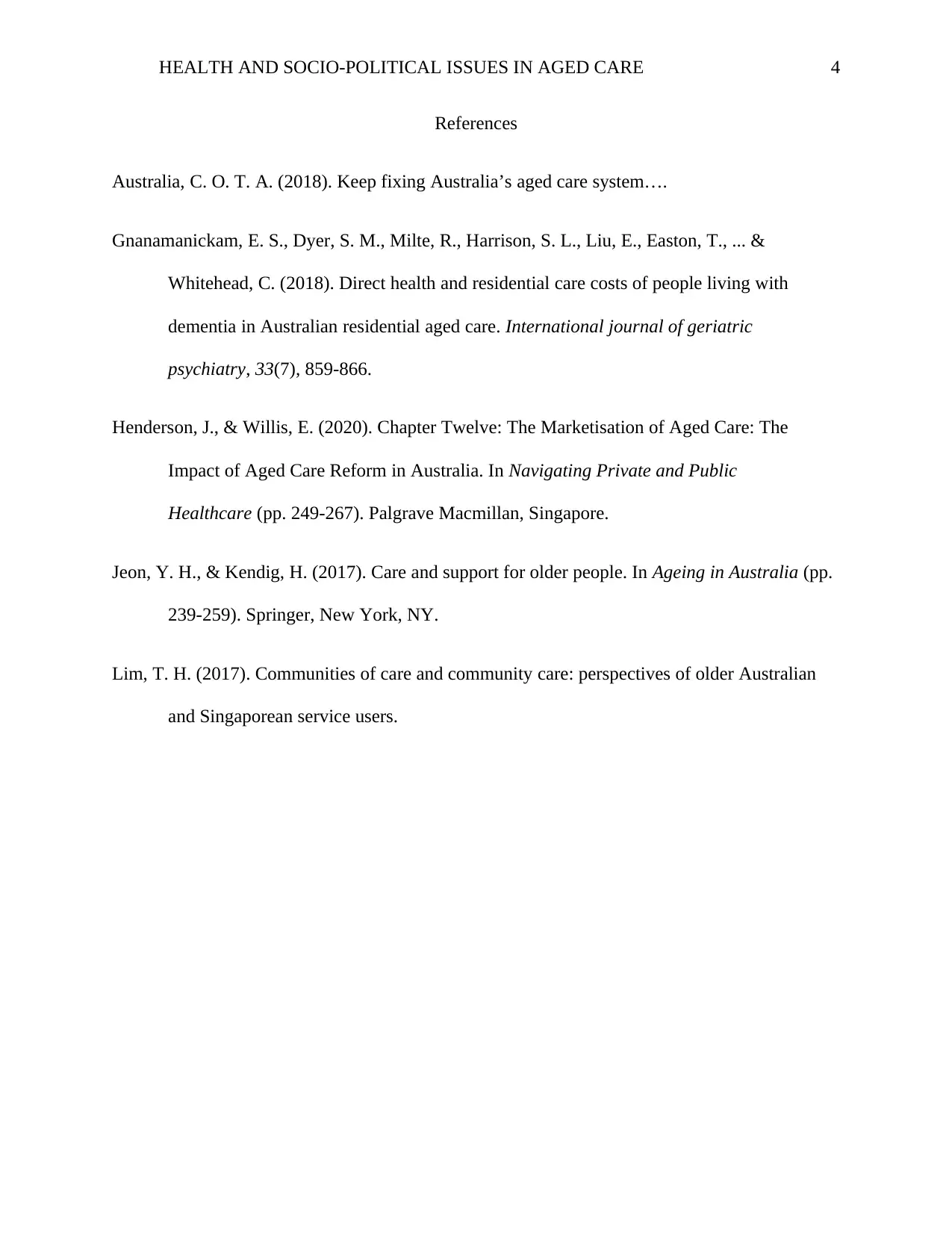Western Sydney University: Aged Care Health and Socio-political Issues
VerifiedAdded on 2022/09/15
|4
|911
|12
Essay
AI Summary
This essay delves into the health and socio-political issues prevalent in the aged care system within Australia. It begins by outlining the user pays system, where the government funds aged care services for individuals over 65, delivered through residential facilities, communities, and in-home care. The essay highlights the political challenges arising from an aging population and the increasing demand for diverse, high-quality services, straining government finances. Ethical concerns are also addressed, particularly regarding access to information for informed decision-making and the lack of social justice within the user contribution system, which places a financial burden on elderly individuals and their families. The essay concludes by advocating for reform to ensure that the aged can receive necessary services while mitigating the financial strain on the government.

Running head: HEALTH AND SOCIO-POLITICAL ISSUES IN AGED CARE 1
Health and Socio-Political Issues in Aged Care
Name of Student
Name of Institution
Date
Author’s Note
Health and Socio-Political Issues in Aged Care
Name of Student
Name of Institution
Date
Author’s Note
Paraphrase This Document
Need a fresh take? Get an instant paraphrase of this document with our AI Paraphraser

HEALTH AND SOCIO-POLITICAL ISSUES IN AGED CARE 2
Health and Socio-Political Issues in Aged Care
In Australia, there is a user pays system for the aged care services. In this system the
government provides funding for the various aged care services aiming at individuals who are
above the age of 65 and require support even in their own home. The aged care services are
provided in residential aged care facilities, communities and in the homes of the aged individual.
According to the Aged care act 1997, the Australian government subsidies the aged care services
for individuals aged above 65. The care is provided through the various funding agreements with
the providers and the result is home care, flexible care and residential care. Despite these
services, most consumer are required to make a financial contribution in order to receive some of
they services. This act has raised several political and ethical issues (Australia, 2018).
One political issue is that the government is unable to continue providing support to aged
individuals. Due to improvement in the healthcare services, Australians are living longer. On the
other hand, the baby boomers are aging, and the number of older Australians is rapidly
increasing. It is estimated that by 2050, the number of elderly Australians will increase for its
current 0.4 million to 1.8 million. Consequently, the number of individuals who will receive the
aged care services in 2050 is estimated to be 3.5 million Australians (Henderson & Willis, 2020).
The older Australiana also require diversity in the range of services being delivered and the
quality of healthcare services. This change can be attributed to the increased development of
lifestyle diseases and the individual preferences of the patients. The government is therefore
unable to keep up with the increasing statistics. The aged care reform is putting a strain of the
financial budget of the country. This has resulted in more users paying for their aged care series
despite the measures that were initially put up by the government (Gnanamanickam et al., 2018)
Health and Socio-Political Issues in Aged Care
In Australia, there is a user pays system for the aged care services. In this system the
government provides funding for the various aged care services aiming at individuals who are
above the age of 65 and require support even in their own home. The aged care services are
provided in residential aged care facilities, communities and in the homes of the aged individual.
According to the Aged care act 1997, the Australian government subsidies the aged care services
for individuals aged above 65. The care is provided through the various funding agreements with
the providers and the result is home care, flexible care and residential care. Despite these
services, most consumer are required to make a financial contribution in order to receive some of
they services. This act has raised several political and ethical issues (Australia, 2018).
One political issue is that the government is unable to continue providing support to aged
individuals. Due to improvement in the healthcare services, Australians are living longer. On the
other hand, the baby boomers are aging, and the number of older Australians is rapidly
increasing. It is estimated that by 2050, the number of elderly Australians will increase for its
current 0.4 million to 1.8 million. Consequently, the number of individuals who will receive the
aged care services in 2050 is estimated to be 3.5 million Australians (Henderson & Willis, 2020).
The older Australiana also require diversity in the range of services being delivered and the
quality of healthcare services. This change can be attributed to the increased development of
lifestyle diseases and the individual preferences of the patients. The government is therefore
unable to keep up with the increasing statistics. The aged care reform is putting a strain of the
financial budget of the country. This has resulted in more users paying for their aged care series
despite the measures that were initially put up by the government (Gnanamanickam et al., 2018)

HEALTH AND SOCIO-POLITICAL ISSUES IN AGED CARE 3
An ethical issue that arises form the user aged care system in Australia is that according
to the code of ethics, the users should have access to information that will contribute to the
patient making an informed decision. Today, the elderly individuals are not given any
information about why they are required to pay additional finances in order to receive the
medical services. The government developed an Act to ensure that the elderly people receive
medical service and other services free of charge. Despite this, the service providers expect the
elderly to contribute. The patient, therefore, is being denied their right to information. Proper
information will educate the patient on the appropriate decision to make regarding their
healthcare services. The user might opt for a more pocket friendly option since they are paying
for their own services (Jeon, & Kendig, 2017).
Another ethical issue is that social justice is not achieved in the user contribution system
in Australia. Most of the individual who are aged lack a means of income. Some of the aged
individuals require support in conducting the simple daily activities. They are dependent on their
families for financial support. Requesting this population to pay for their own medical services is
a social injustice. It is putting an unnecessary burden on the family members and the community
at large (Lim, 2017).
In conclusion, there are serval ethical and political issues that arise from the user
contribution system for the aged in Australia. There is need for a reform to be done and the
appropriate changes to be made in the payment system. The reform will help to ensure that the
aged are able to receive the service while the government does not undergo a financial strain
An ethical issue that arises form the user aged care system in Australia is that according
to the code of ethics, the users should have access to information that will contribute to the
patient making an informed decision. Today, the elderly individuals are not given any
information about why they are required to pay additional finances in order to receive the
medical services. The government developed an Act to ensure that the elderly people receive
medical service and other services free of charge. Despite this, the service providers expect the
elderly to contribute. The patient, therefore, is being denied their right to information. Proper
information will educate the patient on the appropriate decision to make regarding their
healthcare services. The user might opt for a more pocket friendly option since they are paying
for their own services (Jeon, & Kendig, 2017).
Another ethical issue is that social justice is not achieved in the user contribution system
in Australia. Most of the individual who are aged lack a means of income. Some of the aged
individuals require support in conducting the simple daily activities. They are dependent on their
families for financial support. Requesting this population to pay for their own medical services is
a social injustice. It is putting an unnecessary burden on the family members and the community
at large (Lim, 2017).
In conclusion, there are serval ethical and political issues that arise from the user
contribution system for the aged in Australia. There is need for a reform to be done and the
appropriate changes to be made in the payment system. The reform will help to ensure that the
aged are able to receive the service while the government does not undergo a financial strain
⊘ This is a preview!⊘
Do you want full access?
Subscribe today to unlock all pages.

Trusted by 1+ million students worldwide

HEALTH AND SOCIO-POLITICAL ISSUES IN AGED CARE 4
References
Australia, C. O. T. A. (2018). Keep fixing Australia’s aged care system….
Gnanamanickam, E. S., Dyer, S. M., Milte, R., Harrison, S. L., Liu, E., Easton, T., ... &
Whitehead, C. (2018). Direct health and residential care costs of people living with
dementia in Australian residential aged care. International journal of geriatric
psychiatry, 33(7), 859-866.
Henderson, J., & Willis, E. (2020). Chapter Twelve: The Marketisation of Aged Care: The
Impact of Aged Care Reform in Australia. In Navigating Private and Public
Healthcare (pp. 249-267). Palgrave Macmillan, Singapore.
Jeon, Y. H., & Kendig, H. (2017). Care and support for older people. In Ageing in Australia (pp.
239-259). Springer, New York, NY.
Lim, T. H. (2017). Communities of care and community care: perspectives of older Australian
and Singaporean service users.
References
Australia, C. O. T. A. (2018). Keep fixing Australia’s aged care system….
Gnanamanickam, E. S., Dyer, S. M., Milte, R., Harrison, S. L., Liu, E., Easton, T., ... &
Whitehead, C. (2018). Direct health and residential care costs of people living with
dementia in Australian residential aged care. International journal of geriatric
psychiatry, 33(7), 859-866.
Henderson, J., & Willis, E. (2020). Chapter Twelve: The Marketisation of Aged Care: The
Impact of Aged Care Reform in Australia. In Navigating Private and Public
Healthcare (pp. 249-267). Palgrave Macmillan, Singapore.
Jeon, Y. H., & Kendig, H. (2017). Care and support for older people. In Ageing in Australia (pp.
239-259). Springer, New York, NY.
Lim, T. H. (2017). Communities of care and community care: perspectives of older Australian
and Singaporean service users.
1 out of 4
Related Documents
Your All-in-One AI-Powered Toolkit for Academic Success.
+13062052269
info@desklib.com
Available 24*7 on WhatsApp / Email
![[object Object]](/_next/static/media/star-bottom.7253800d.svg)
Unlock your academic potential
Copyright © 2020–2026 A2Z Services. All Rights Reserved. Developed and managed by ZUCOL.




